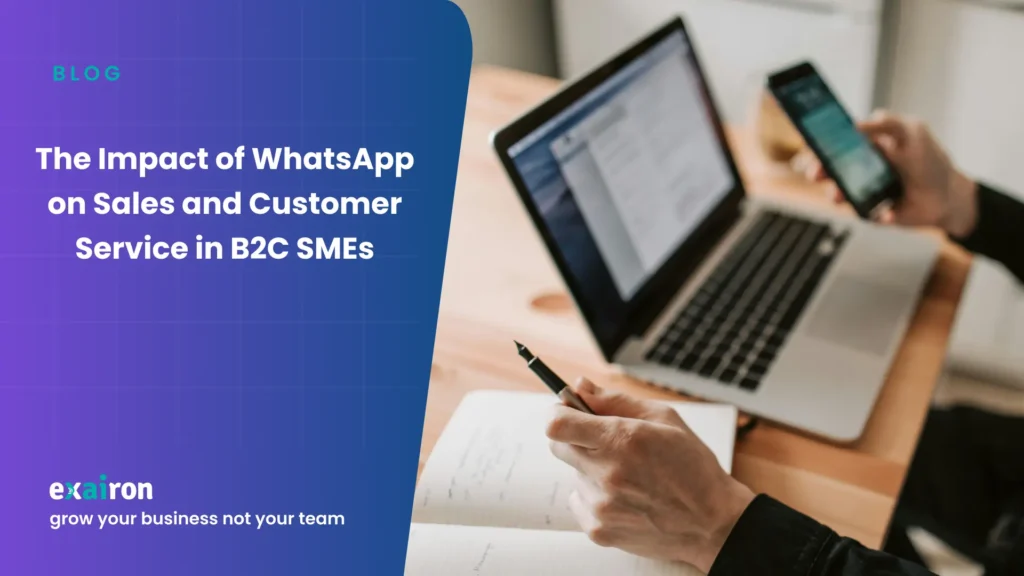In today’s fast-paced digital world, the way businesses interact with their customers has undergone a radical transformation. This shift is particularly evident in the realm of Small and Medium-sized Enterprises (SMEs), where effective communication can be the linchpin of success. Among the myriad of digital tools revolutionizing this landscape, WhatsApp has emerged as a front-runner, especially for B2C interactions. Initially perceived as a mere messaging app for personal use, WhatsApp has ingeniously evolved into a pivotal business communication tool, particularly with the advent of WhatsApp Business. This evolution marks a significant shift in how SMEs approach customer engagement and sales strategies.
For B2C SMEs, the ability to communicate effectively with customers is not just a convenience—it’s a critical component of business success. In an era where customer experience often dictates the competitive edge, WhatsApp’s seamless and intuitive platform offers an unparalleled opportunity to connect with customers on a platform they already use and love. This isn’t just about staying in touch; it’s about leveraging a familiar tool to enhance all facets of business operations—from sales pitches to post-purchase support.
The adoption of WhatsApp by SMEs signifies more than just an adoption of new technology; it represents a strategic move towards more personalized, immediate, and effective customer communication. With its massive user base, WhatsApp provides a direct line to customers, bypassing the clutter and noise of traditional communication channels. The convenience for customers is clear: they can receive quick responses, get personalized recommendations, and have their queries addressed promptly, all within an app they use daily.
Moreover, WhatsApp’s impact on SMEs extends beyond mere communication. It is reshaping the very paradigms of customer service and sales processes. By enabling direct and instant communication, SMEs can offer a more responsive and tailored customer experience. This level of interaction was once the preserve of larger corporations with extensive resources. Now, even the smallest of businesses can provide a level of service that rivals the biggest players in the market.
As we delve deeper into this blog, we will explore the multifaceted ways in which WhatsApp is transforming the B2C SME sector. From enhancing sales through innovative features to revolutionizing customer service with AI and automation, WhatsApp is not just a tool; it’s a game-changer in the world of business communication.
The Rise of WhatsApp Business in SME Ecosystem
The emergence of WhatsApp Business as a dominant force in the SME ecosystem marks a pivotal moment in the evolution of digital business communication. Launched in 2018, WhatsApp Business was specifically designed to meet the unique needs of small and medium-sized businesses, enabling them to connect with customers in a more streamlined and effective manner. This platform isn’t just a messaging app; it’s a comprehensive business tool that offers a multitude of features tailored for SMEs.
At the core of WhatsApp Business’s appeal is its familiarity and ease of use. With over 2 billion active users globally, WhatsApp’s ubiquity means that most customers are already comfortable and familiar with the app. This familiarity eliminates the learning curve associated with new platforms, making it an ideal choice for businesses looking to communicate with a broad customer base without the barrier of introducing them to a new application.
The impact of WhatsApp Business on the SME sector is profound. It’s not just about the ease of sending messages; it’s about building relationships. Features like business profiles provide essential information at a glance, such as business hours, descriptions, and website links, enhancing transparency and trust. Moreover, automated messages and quick replies allow SMEs to maintain consistent communication with their customers, even when they are not available to respond in real-time.
The versatility of WhatsApp Business also extends to its ability to facilitate not just communication but also transactions. Features like catalogues and shopping carts have transformed WhatsApp into a platform where business transactions can occur seamlessly. This integration of communication and commerce has opened new avenues for SMEs to increase their sales and improve customer engagement.
Furthermore, WhatsApp Business API takes this a step further by enabling larger SMEs to integrate the platform into their existing customer service and CRM systems. This integration allows for a more scalable and robust approach to customer interactions, providing SMEs with the tools to manage high volumes of messages and automate customer engagement processes effectively.
In essence, WhatsApp Business has become more than just a tool; it’s a fundamental part of the SME operational fabric, redefining how businesses interact with their customers in the digital age. As we move forward, the role of WhatsApp Business in the SME ecosystem is set to become even more integral, especially as businesses continue to seek innovative ways to enhance customer experience and engagement.
Enhancing Sales through WhatsApp
The integration of WhatsApp into the sales strategies of B2C SMEs has opened up a new horizon in customer interaction and sales enhancement. This transformation is not just about the ease of messaging but about leveraging a platform that is already a staple in the daily lives of billions of users worldwide. WhatsApp, with its massive global user base, offers SMEs a direct and personal way to reach out to potential customers, thereby greatly enhancing the potential for sales.
One of the most significant advantages of using WhatsApp for sales is the ability to create a more personalized shopping experience. Through direct conversations, businesses can understand their customers’ preferences and needs in real time, allowing them to offer tailored recommendations. This personal touch is something that often gets lost in traditional online shopping experiences.
The use of WhatsApp’s product catalog feature is particularly transformative. SMEs can showcase their products or services directly within the app, providing customers with a convenient way to browse and inquire about products without leaving the chat. This seamless integration of browsing and communication significantly shortens the customer journey from interest to purchase.
Furthermore, the ability to send instant updates and promotions via WhatsApp keeps customers engaged and informed. This direct line of communication ensures that SMEs can reach their audience with the right message at the right time, increasing the likelihood of sales. It’s a strategy that combines the immediacy of social media marketing with the personalization of direct messaging.
In addition, the use of WhatsApp for sales also includes the ability to provide immediate responses to inquiries and support requests. This responsiveness not only enhances customer satisfaction but also builds trust and loyalty, which are critical factors in repeat sales and word-of-mouth referrals.
WhatsApp’s end-to-end encryption ensures that these interactions are secure, which is crucial in building customer trust, especially when it comes to transactions. The platform’s commitment to privacy and security is a significant factor in its suitability for conducting business transactions.
In summary, WhatsApp has redefined the sales process for B2C SMEs by providing a platform that is both a communication tool and a sales channel. Its ability to create a personalized and secure shopping experience directly within a chat interface is a game-changer, offering SMEs a unique opportunity to enhance their sales and grow their customer base.
Revolutionizing Customer Service with WhatsApp
The advent of WhatsApp as a tool for customer service has been nothing short of revolutionary for B2C SMEs. This popular messaging app, known for its simplicity and broad reach, has transformed into a powerful platform for customer interaction and support. By integrating WhatsApp into their customer service strategies, SMEs are able to offer a level of responsiveness and personalization that was previously unattainable for many small and medium-sized businesses.
One of the key elements in this revolution is the immediacy that WhatsApp brings to customer interactions. In an era where consumers expect quick and efficient service, the ability to respond to inquiries and resolve issues in real time through WhatsApp is a significant advantage. This immediacy not only enhances customer satisfaction but also builds loyalty and trust, as customers feel valued and heard.
The integration of artificial intelligence and chatbots into WhatsApp further elevates the customer service experience. SMEs can automate responses to common queries, providing instant assistance to customers at any time of the day. This not only improves efficiency but also allows human customer service representatives to focus on more complex issues, ensuring that each customer receives the attention they need.
Furthermore, WhatsApp’s multimedia capabilities enable SMEs to provide a richer customer service experience. Businesses can send images, videos, voice notes, and documents to assist customers more effectively. This capability is especially useful for product demonstrations, troubleshooting, and providing detailed information that can be easily accessed and reviewed by the customer.
Another significant advantage of WhatsApp for customer service is the personal touch it adds to customer interactions. Unlike traditional call centers or email support, WhatsApp conversations are more informal and personal, fostering a stronger connection between the customer and the brand. This personalized approach not only enhances customer satisfaction but also encourages repeat business and referrals.
In addition, WhatsApp’s end-to-end encryption ensures that conversations remain private and secure, an essential factor for both businesses and consumers. This security feature builds trust, as customers can confidently share personal information, knowing that their data is protected.
In conclusion, WhatsApp has revolutionized customer service for B2C SMEs by providing a platform that combines immediacy, efficiency, personalization, and security. This transformation is not just changing how businesses interact with their customers; it’s setting a new standard for customer service in the digital age.
Automation and Efficiency through WhatsApp
In the current business landscape, where time is a valuable commodity, the automation and efficiency offered by WhatsApp are proving to be game-changers for B2C SMEs. This evolution of WhatsApp from a simple messaging platform to a tool that can automate and streamline business processes is a significant leap forward, especially for businesses with limited resources.
The automation capabilities of WhatsApp Business are transformative. Features like automated greetings and quick replies not only enhance the customer experience by providing instant communication but also free up valuable time for business owners and employees. These automated responses can handle basic inquiries, such as business hours, services offered, or pricing information, ensuring that customers receive immediate assistance, even outside of regular business hours.
Additionally, the ability to set up automated messages for specific situations, such as welcoming new customers or following up on inquiries, adds a level of professionalism and consistency to customer interactions. This automation helps maintain a steady flow of communication and nurtures customer relationships, which is crucial for building loyalty and trust.
The efficiency of WhatsApp Business extends to its integration capabilities. Many SMEs now integrate WhatsApp with their Customer Relationship Management (CRM) systems, which allows for a seamless flow of customer information. This integration enables businesses to track customer interactions, manage leads, and personalize communication based on customer history, all within the WhatsApp platform.
Moreover, the ability to organize and label chats makes managing customer conversations more manageable. SMEs can categorize conversations based on factors like urgency, type of inquiry, or customer value. This organization aids in prioritizing responses and ensures that high-priority messages are addressed promptly, enhancing overall response efficiency.
The inclusion of WhatsApp Business API for medium and larger SMEs takes these benefits to the next level. It allows for more extensive automation and integration, handling higher volumes of messages and complex customer service scenarios. This scalability is particularly important for growing businesses that need to manage increasing customer interactions without compromising on service quality.
In essence, WhatsApp Business is not just enhancing communication; it’s revolutionizing business operations for SMEs. The platform’s automation and efficiency features are helping SMEs to optimize their time and resources, focus on growth, and maintain a high standard of customer service, all of which are vital for success in today’s competitive market.
Case Studies: Success Stories of SMEs Using WhatsApp
The transformative impact of WhatsApp on B2C SMEs becomes even more apparent through real-world case studies. These success stories illustrate how integrating WhatsApp into business practices can lead to tangible improvements in sales, customer engagement, and overall operational efficiency. Let’s delve into a couple of illustrative examples.
An inspiring story comes from GGCorp. They faced challenges in managing customer inquiries and interactive event management. Integration of Exairon’s artificial intelligence solutions enabled them to automate customer inquiries and make event management processes more efficient.
Moreover, GGCorp integrated Exairon’s advanced artificial intelligence platform into their website and WhatsApp channel, providing a more personalized approach to customer communication. This integration allowed their team to provide instant support, rapidly respond to participant inquiries, and automatically create tickets for complex situations, thereby facilitating event management and enhancing participant satisfaction. The impact was immediately noticeable: there was a significant increase in operational efficiency in customer communication and event management, and a marked improvement in customer satisfaction ratings.
This case study demonstrates how Exairon’s artificial intelligence solutions can transform the operations of companies operating in the gaming and esports sectors. The ability to increase customer interactions, organize event management, and ultimately enrich the customer experience is evidence of the effectiveness of this technological innovation as a business tool. The collaboration between GGCorp and Exairon is just one example of many companies leveraging artificial intelligence technologies integrated into their business strategies.
Example Case Study 2: Kolektif House
Another case study is based on the collaboration between Kolektif House and Exairon. Kolektif House is an innovative and dynamic coworking space provider that prioritizes enhancing customer interaction and service quality. As a solution, the company turned to Exairon’s Customer Experience Automation Platform. With Exairon, they were able to enrich the customer experience by providing instant customer support services via tools like Webchat and WhatsApp. Customers could directly ask questions across different channels, contributing to a smoother service process.
Additionally, Kolektif House utilized AI-powered automated responses to instantly address customer needs, significantly reducing response time and ensuring customers received instant and consistent information. As a result, there was a significant increase in customer satisfaction and a noticeable improvement in service quality within the first few months of implementing the Exairon Customer Experience Automation Platform. These improvements marked a significant milestone in Kolektif House’s digital transformation journey and demonstrated a successful implementation of an innovative approach to customer service in the coworking space sector.
Challenges and Considerations in Using WhatsApp for SMEs
While WhatsApp offers numerous benefits for B2C SMEs, it’s important to acknowledge and prepare for potential challenges and considerations that come with its adoption. Understanding these aspects ensures that businesses can leverage WhatsApp effectively while mitigating any potential drawbacks.
1. Managing Customer Expectations
One of the main challenges is managing customer expectations regarding response times. WhatsApp’s instant messaging nature can lead customers to expect immediate responses, even outside of business hours. SMEs need to set clear expectations about response times and possibly use automated messages to inform customers when they can expect a reply.
2. Data Privacy and Security Concerns
Data privacy and security are crucial considerations, especially with the increasing scrutiny on digital data handling. WhatsApp does offer end-to-end encryption, which is a significant advantage. However, SMEs must ensure they are compliant with data protection regulations such as GDPR when using WhatsApp to communicate with customers, especially when handling personal data.
3. Balancing Automation with Personalization
While automation features like chatbots are highly efficient, over-reliance on them can lead to impersonal customer experiences. It’s crucial for SMEs to find the right balance between using automation for efficiency and maintaining a personal touch in customer interactions. In this context, Exairon’s hybrid automation solutions come to the fore.
4. Integration with Existing Systems
Integrating WhatsApp with existing business systems (like CRM software) can be challenging, especially for SMEs with limited technical resources. Proper integration is essential for maintaining a seamless flow of customer information and ensuring that all parts of the business are aligned.
5. Overcoming the Limitations of the Platform
WhatsApp, while versatile, has limitations, such as the inability to handle complex customer service scenarios or integrate deeply with certain types of business software. SMEs need to be aware of these limitations and plan accordingly, possibly using WhatsApp as part of a broader set of tools rather than a standalone solution.
6. Keeping Up with Platform Changes
Lastly, staying abreast of changes and updates to the WhatsApp platform is crucial. New features and policy updates can significantly impact how SMEs use the app for business purposes. Continuous learning and adaptability are key to leveraging the platform effectively over time.
In conclusion, while WhatsApp presents a valuable opportunity for SMEs to enhance their customer interaction and sales, it comes with its own set of challenges and considerations. By addressing these aspects proactively, SMEs can harness the full potential of WhatsApp as a powerful tool for business growth and customer engagement.
Conclusion
As we have explored throughout this blog, WhatsApp’s influence on B2C SMEs is both profound and multifaceted. This platform, initially designed for personal communication, has morphed into a crucial business tool, reshaping how small and medium-sized enterprises engage with customers, drive sales, and streamline their operations. The transition to using WhatsApp Business represents more than just an adoption of new technology; it signifies a strategic shift towards more efficient, personalized, and responsive customer interactions.
The case studies and examples cited demonstrate the tangible benefits that WhatsApp offers. From enhancing sales through direct and personalized customer interactions to revolutionizing customer service with automation and AI integration, WhatsApp is enabling SMEs to achieve a level of efficiency and customer engagement that was once the preserve of larger corporations with deeper pockets. Furthermore, the ability to automate responses and integrate with existing business systems has allowed SMEs to focus more on growth and less on the minutiae of day-to-day operations.
However, as with any technological adoption, there are challenges and considerations. Issues such as managing customer expectations, ensuring data privacy, and finding the right balance between automation and personalization are crucial. Moreover, the need to stay updated with the platform’s evolving features and policies requires a commitment to continuous learning and adaptability.
In summary, WhatsApp Business has emerged as a powerful ally for B2C SMEs. It offers a unique blend of accessibility, convenience, and sophistication in customer engagement and business operations. As the digital landscape continues to evolve, SMEs that effectively leverage platforms like WhatsApp are likely to stay ahead in the increasingly competitive business environment. Embracing these digital tools is not just about keeping up with technological trends; it’s about being where your customers are and serving them in the best way possible.
The future of SMEs in the digital age looks promising, and tools like WhatsApp Business will play a significant role in shaping this future. By understanding and utilizing the full potential of WhatsApp, SMEs can not only enhance their current operations but also pave the way for sustained growth and success.
Further Reading
For those keen on delving deeper into the world of WhatsApp Business and its impact on B2C SMEs, a wealth of resources is available. These materials not only provide additional insights but also offer practical tips and strategies for effectively integrating WhatsApp into your business processes. Here are some recommended readings and resources:
WhatsApp Business API Documentation: A comprehensive guide provided by WhatsApp itself, offering detailed insights into how the API works and how it can be integrated into your business systems. [Link to WhatsApp Business API Documentation]
Case Studies on WhatsApp Business Usage: Explore a collection of real-world case studies highlighting how various businesses have successfully implemented WhatsApp Business to enhance customer engagement and sales. These stories can provide practical examples and inspiration. [Link to WhatsApp Business Case Studies]
Data Protection and WhatsApp: For understanding the intricacies of data protection and privacy laws in relation to using WhatsApp for business, this resource offers valuable information. It’s essential for ensuring compliance with regulations like GDPR. [Link to Data Protection Guide]
Books on Digital Marketing and Customer Engagement: Titles such as ‘Digital Marketing for Dummies’ by Ryan Deiss and Russ Henneberry, and ‘Hug Your Customers’ by Jack Mitchell provide insights into digital marketing strategies and customer engagement, which are crucial in the context of using WhatsApp for business. [Hug Your Customers]&[Digital Marketing for Dummies]
Blogs and Articles: Several industry blogs and articles discuss the latest trends and best practices in using messaging apps like WhatsApp for business purposes. These can be a source of ongoing information and tips. [Whatsapp Marketing Playbook]
By exploring these resources, SMEs can gain a deeper understanding of how to effectively use WhatsApp Business, stay compliant with legal requirements, and ultimately leverage the platform for business growth and enhanced customer relationships.














